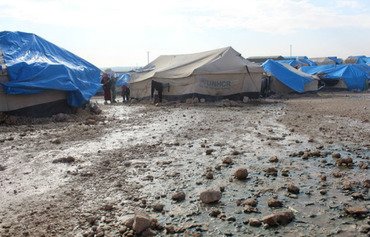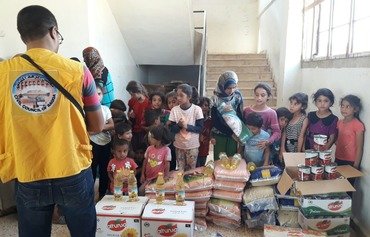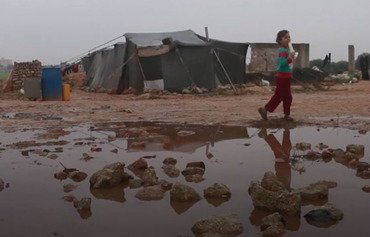Al-Raqa Civil Council is preparing Ain Issa displacement camp for the winter by providing key services in co-ordination with the camp's administration and various humanitarian organisations, activists told Diyaruna.
Ain Issa, in northern rural al-Raqa province, houses more than 23,000 internally displaced persons (IDPs) from al-Raqa, Deir Ezzor and Iraq who fled there to escape the "Islamic State of Iraq and Syria" (ISIS).
Working with humanitarian organisations inside the camp, Al-Raqa Civil Council has set up tents, distributed tarpaulins, established medical posts and administered vaccines to Ain Issa residents.
The council, the camp’s administration and a number of relief and medical organisations are racing to prepare the camp for the winter, council member Mahmoud al-Fayyad told Diyaruna.
![Mattresses and other aid awaits distribution at Ain Issa camp in al-Raqa province, which is hosting more than 20,000 internally displaced persons from Syria and refugees from Iraq. [Photo courtesy of Syrian Democratic Forces]](/cnmi_di/images/2017/11/15/10319-Syria-Raqa-camp-600_384.jpg)
Mattresses and other aid awaits distribution at Ain Issa camp in al-Raqa province, which is hosting more than 20,000 internally displaced persons from Syria and refugees from Iraq. [Photo courtesy of Syrian Democratic Forces]
"The preparations are comprehensive and include preparing, shoring up and storm-proofing tents and providing means of heating and adequate supplies of heating fuel, blankets and clothes," he said.
The council has been working to complete the sewage network to prevent rainwater from mingling with sewage water and contaminating the camp, which would create an environmental and health hazard, he said.
Efforts also are under way to secure tarpaulins for all the tents in the camp to insulate them from the rain.
"During the first week of November, 4,000 tarpaulins were distributed to be affixed to tents to protect them from the rain and laid on the tent floors to protect against water," al-Fayyad said.
The council also is setting up and equipping emergency clinics, he said, while some relief organisations have distributed food and heating equipment.
Meanwhile, the Greek Orthodox charitable organisation GOPA DERD has set up a clothing workshop where women from the camp work to meet the winter clothing needs of the camp’s residents, especially children.
Of the camp's residents, "a small number of families recently returned to al-Raqa city and its villages, and more may follow", al-Fayyad said, adding that most are unable to return to due to proliferation of mines and widespread destruction.
Medical services at the camp
The Kurdish Red Crescent has been working with al-Raqa Civil Council medical and health committees to set up a medical centre in the camp in co-ordination with other relief organisations, said Kurdish Red Crescent official Azad Dudeki.
The goal is to treat common ailments and emergency cases in order to avoid the need to transport residents elsewhere for treatment during winter, he said.
Vaccination drives for children are continuing in the camp in co-operation with organisations such as the Doctors Without Borders (MSF), he added.
"A second medical centre is expected to be opened in a month or less to serve the camp’s residents," Dudeki said, adding that medical services are provided to civilians free of charge.
Organisations including the French non-governmental Agency for Technical Co-operation and Development (ACTED) and al-Mawaddah have distributed hundreds of food rations, blankets, mattresses and personal hygiene items.
A relief kitchen has been set up to provide hot meals to the camp’s residents, he added, and work is under way to expand the kitchen to increase its production of hot meals during the winter.
Camp residents pull together
"All the camp’s residents are working together to prepare for the winter season as the resources provided by relief organisations and the civil council are modest relative to the large number of IDPs," said camp resident Mahmoud Ali al-Salem.
The camp's residents are trying to adapt to the amount of aid available to them, the former Deir Ezzor resident told Diyaruna, and are distributing it among themselves in preparation for the winter.
"The men and youth in the camp are layering the tent floors with stones and elevating them higher than the campground to keep water out," he said.
Some tent floors have been paved with cement to improve their quality, he added.
Al-Salem said the summer heat damaged many of the tents, rendering them unusable.
"This created a shortage in tents at a time when the influx of IDPs from Deir Ezzor and Iraq is increasing daily," he noted.
Some IDPs who can afford it buy tents and tarpaulins at their own expense for themselves and others, he said.
"As for the blankets and mattresses, the available quantity does not cover the need, but families are managing among themselves," he added.
Camp residents know they will have to survive the winter at the camp, he said, as they cannot return home until all mine and rubble removal operations have been completed.

![A volunteer stabilises a tent at the Ain Issa displacement camp in northern al-Raqa province. [Photo courtesy of Syrian Democratic Forces]](/cnmi_di/images/2017/11/15/10318-Syria-Raqa-camp-600_384.jpg)






